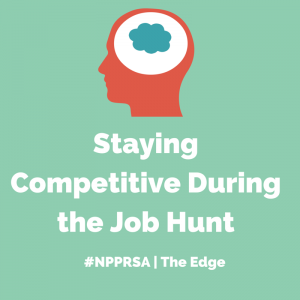Editor’s note: The following recaps Laura Cardon’s experience at PRSA Colorado’s recent workshop. Find your upcoming local PRSA events here.
After getting carded immediately upon entering the Mile High Moguls job search workshop, I suddenly realized I might be the only person in attendance that had graduated from college.
This turned out to be true, but I considered the night a success despite feeling a bit out of place. Andrew Hudson’s job interview workshop was incredibly helpful, AND I discovered that I still look young enough to get carded!
 Many of Andrew’s points drew close parallels to what we are already well-versed in as PR professionals:
Many of Andrew’s points drew close parallels to what we are already well-versed in as PR professionals:
- Tell a story,
- Prepare thoroughly,
- Be honest, and
- Create a personal brand that people want to be loyal to.
Sounds familiar right?
It’s easy to forget that you have this skill set when you’re searching for a job. Multiple rejections, or even simply no response at all, start to wear on even the most upbeat person.
But don’t get stuck in the quicksand – you have more control over your future than you may think.
Andrew was quick to point out that you actually enjoy total control over several aspects of your job search, and that doesn’t just mean interview prep.
You have control over your personal brand, woven together by:
- Your personal social media presence,
- A well-prepared elevator pitch and cold call script, and
- A polished resume.
You control all of these things, and if you do your homework and enlist the help of others for advice, your chances of getting an interview increase exponentially.
Once you’ve made it into that interview, Andrew emphasized that you want to be a sigh of relief for your interviewers, that “ahh” feeling when they realized they have found exactly who they need.
You are the solution to their problem.
How do you present yourself as that sigh of relief?
Make it clear why you are the best candidate, backed up with specific examples of relevant work and how you will add value to the company or organization.
For example, don’t say you’re hard-working. Everyone is hard-working.
Show your interviewers how you are hard-working based on a story you can tell about a time you’ve gone above and beyond.
In the end, the most successful job seekers truly make it their full time job. (Click to tweet!)
If you’re not currently employed, it’s easy to get a bit lazy, but you’re much more likely to be successful if you treat your job hunt like you are going to work each morning.
Andrew suggested making a routine – spending x amount of time on cold calls, actively searching for jobs, interview prep, etc.
Don’t forget that looking for a job is a skill that can be developed. And under no circumstances forget to send a written thank you note to your interviewer!
—
Andrew Hudson’s Job List is an excellent resource for job seekers in the Denver metro area (it’s actually where I found my job). Just to be clear, none of the above advice is my own – it is all based on Andrew’s workshop and his fantastic advice. Linhart PR was kind enough to host us for the Mile High Moguls event, which benefitted PRSSA at Colorado State University. For more information about PRSA Colorado, visit www.prsacolorado.org.
Other resources from Andrew:
-
Personal branding at its finest from Frontier Airlines
-
Body language and power poses TED talk
 Laura Cardon is a public relations professional living in Denver, CO. Originally from Maryland, Laura enjoys riding horses, hiking, and volunteering at the Denver Animal Shelter. In her spare time, Laura also shares her passion for the great outdoors with fellow beginner outdoors enthusiasts on her blog, Outdoors Beginner. Find her on Twitter @LauraCardon23.
Laura Cardon is a public relations professional living in Denver, CO. Originally from Maryland, Laura enjoys riding horses, hiking, and volunteering at the Denver Animal Shelter. In her spare time, Laura also shares her passion for the great outdoors with fellow beginner outdoors enthusiasts on her blog, Outdoors Beginner. Find her on Twitter @LauraCardon23.









